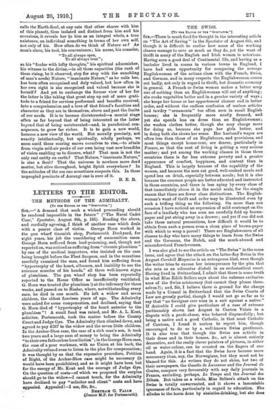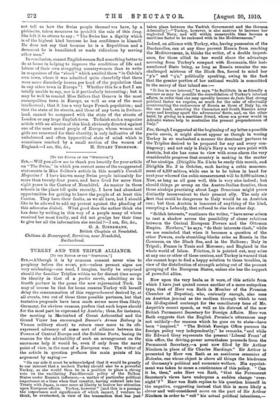THE SWISS.
[To THR EDITOR or TIER "SrECTI.TOR..1 Sta,—There is much food for thought in the interesting article on "The Art of Saving" in the Spectator of August 6th, and though it is difficult to realise how some of the working classes manage to save as much as they do, yet the want of thrift in many of the English and Irish women is notorious. Having seen a good deal of Continental life, and having as a bachelor lived in rooms in various towns in England, I have had some opportunity for comparing the average Englishwoman of the artisan class with the French, Swiss, and German, and in many respects the Englishwoman comes out badly, not only in regard to thrift, but domestic economy in generaL A French or Swiss woman makes a better soup out of nothing than an Englishwoman will out of anything ; she cooks vegetables better and in a greater variety of ways ; she keeps her house or her appartement cleaner and in better order, and without the endless confusion of useless articles and tawdry " ornaments " too often seen in small English houses; she is frequently more neatly dressed, and yet she spends less on dress than an Englishwoman ; she washes clothes better, though she may charge more for doing so, because she pays her girls better, and in doing both she shows her sense. Her husband's wages are often less than those of an Englishman, and provisions, and most things except house-rent, are dearer, particularly in France, so that the cost of living is getting a very serious matter ; and yet among the working classes in those three eountries there is far less extreme poverty and a greater appearance of comfort, happiness, and content than in England. This is largely because of the capability of the women, and because the men eat good, well-cooked meals and spend less on drink, especially between meals ; but it is also because the common people are better educated and instructed in those countries, and there is less aping by every class of that immediately above it in the social scale, for the simple reason that there are fewer class distinctions. The English- woman's want of thrift and order may be illustrated even by such a trifling thing as the following. On more than one occasion I have noticed an expression of mild contempt on the face of a landlady who has seen me carefully fold up brown- paper and put string away in a drawer ; and yet if one did not take these natural precautions, how difficult it would be to obtain from such a person even a clean piece of brown-paper with which to wrap a parcel! There are Englishwomen of all classes to-day who have many things to learn from the Swiss and the Germans, the Dutch, and the much-abused and misunderstood Frenchwomen.
I was also glad to see the article on " The Swiss " in the same issue, and agree that the attack on the latter-day Swiss in the August Cornhill Magazine is an outrageous libel, even though the writer tries to excuse her intemperance by the plea that she acts as an advocatus diaboli in an ecclesiastical court. Having lived in Switzerland, I admit that there is some truth in what Miss Edith Sellers says about the extreme exclusive- ness of the Swiss aristocracy (but cannot they please them- selves ?); and, Sir, I believe there is ground for the charge made by a Consul in Switzerland that the Swiss Courts of Law are grossly partial, though I would not go so far as to say that " no foreigner ever wins in a suit against a native." If desirable I could give particulars of a case of extreme partisanship shown last August in Canton Valais in a dispute with a garde-chasse, who behaved disgracefully ; but being a native and a good Catholic, in that most Catholic of Cantons, I found it useless to report him, though encouraged to do so by a well-known Swiss gentleman. It is also true that though the Swiss are artistic in their dress and in their houses, &c., art is almost entirely decorative, and the really clever painters of pictures, in either oil or water-colour, can be counted on the fingers of one hand. Again, it is a fact that the Swiss have become more mercenary than, say, the Norwegians, but they must not be blamed for this. As writers they do not shine, but two of their newspapers, the Gazette de Lausanne and the Journal de Geneve, compare very favourably with any daily journals in France, excluding, perhaps, Le Temps and the Journal des Debats. But taken as a whole, Miss Sellers's attack on the Swiss is totally unwarranted, and it shows a lamentable ignorance of facts, particularly in regard to education. She alludes to the harm done by absinthe-drinking, but she does
not tell us how the Swiss people themsel ves have, by a plebiscite, taken measures to prohibit the sale of this drug. She left it to others to say : " The Swiss has a dignity which is of the highest kind because he has confidence in himself. He does not say that because he is a Republican and a democrat he is humiliated or made ridiculous by serving other men."
In conclusion, cannot Englishwomen find something better to do at home in helping to improve the conditions of life and labour of their own struggling countrywomen than to write in magazines of the "shock" which awaited them "in Calvin's own town, where it was admitted quite cheerfully that there were more disorderly houses per head of the population than in any other town in Europe "! Whether this be a fact I am totally unable to say, nor is it particularly interesting ; but it may be well to remind Miss Sellers that Geneva is the most cosmopolitan town in Europe, as well as one of the most intellectual; that it has a very large French population ; and that the state of its streets, and those of any town in Switzer- land, cannot be compared with the state of the streets of London or any large English town. To finish such a magazine article with an allusion of this kind, obviously directed against one of the most moral people of Europe, whose women and girls are renowned for their chastity, is only indicative of the unbalanced and often hypocritical state of mind which is sometimes reached by a small section of the women of







































 Previous page
Previous page